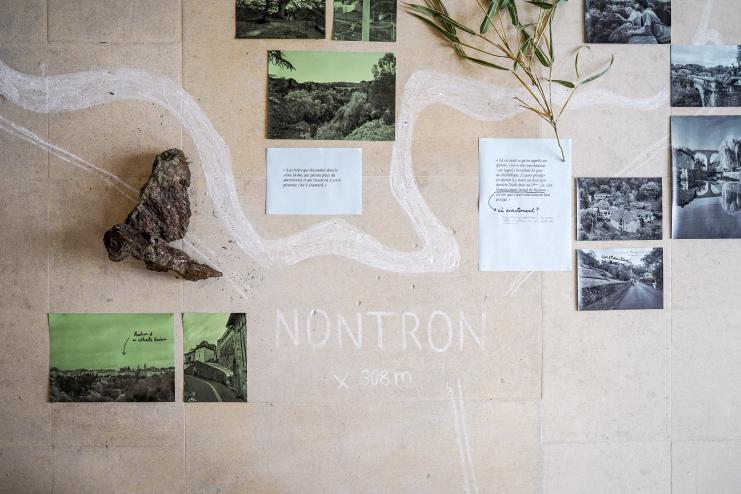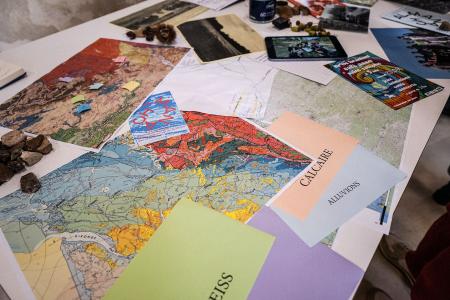Designing Rural Environments

This post-Master’s program counts on design’s ability to revitalize areas. It acts as an artist residency, a laboratory and a research unit at the same time.
- The identity of rural areas
- The various ways water is used
- Rural mobility
- An artist residency in that it provides lodging, a shared studio, a grant to cover
- A laboratory in that it focuses on experimentation and social innovation;
- A research unit in that it studies, directly on-site, the development of projects which unfold in response to localized issues or in partnership with local organizations (associations, schools etc).
- An incubator in that it allows to test and strengthen professional projects.
- Site web dédié
- Appel à candidature (à venir)
- E-mail mondes.ruraux@ensad.fr
Présentation
The program, which is based in Nontron (Southwestern France), welcomes 6 to 8 students
each year and is designed to provide solutions to concrete local issues.
Rural areas are less regarded than urban areas, they face various forms of land abandonment and are undergoing a transition process which the health crisis tends to accelerate. The major issues of our times are all there to be found, though more deep-rooted and pressing than anywhere else. They include mobility, public services, population ageing, health, digital divide, food, forms of togetherness and of work organization, etc.
As design attaches major importance to uses, it has a key role to play regarding the rural issues that have not yet been examined. Through his on-site and concrete study of rural areas, the École des Arts Décoratifs helps shaping a generation of artists and designers who are keen to reinvent our lifestyles and who strongly support a sustainable transition, a matter which affects us all.

How the program works
The program takes place over an academic year (from September to June) and revolves around three demanded themes, also calledon-site research projects, which are chosen and required by local authorities, institutions, companies, people or associations and which allow students to tackle concrete issues. The demanded themes focus on some of the most pressing issues of the specific area, but they also are likely to relate to rural issues as a whole.
In 2022-2023; the demanded themes tackled:
Those issues are studied on a local scale, with the aim of applying them to a larger one - to other rural areas.
The program has various functions and acts as:
production and living expenses and an environment that favors research and projects
development. The selected candidates live on-site and have access to the infrastructures
and equipment of several partner institutions, depending on their needs.
The program also intends to introduce design practices to the actors of the rural world and to arouse their interest about the latter.
The participants are supervised by teachers of the École des Arts Décoratifs and thrive on occasional meetings with guest artists and theorists (geographers, sociologist, anthropologist, biologist...). They benefit from a year-round support which allows them to become acquainted with localized approaches and with both innovative and collaborative methods that will permanently transform their practices.
Each participant receives a 8,000 euros grant.
Candidatures
Procédure de candidature pour la session 2023-2024 : L’appel à candidature se clôture le 31 mai et s’adresse à des profils âgé·es de moins 31 ans au 31 décembre 2023 et titulaires d’un Master 2 au 1er septembre ou justifiant de 3 ans au moins d’expérience professionnelle dans les domaines du design, de l’architecture, du paysagisme ou des sciences humaines et techniques (sociologie, anthropologie, géographie, ingénierie environnementale, agronome…) avec une connaissance des méthodes d’enquête. Le dossier de candidature numérique est constitué :
D'une lettre de motivation
D’un CV D’une copie de la carte d’identité et des diplômes d’enseignement supérieur
D’un dossier de projets de 10 pages maximum.
Les dossiers de candidature doivent être déposés avant le 31 mai 2023 minuit sur notre plateforme.
Les candidat·es présélectionné·es seront invité·es à un entretien durant le mois de juin avec un jury composé de personnalités extérieures et de représentant·es de l’Ecole des Arts Décoratifs.
Critères d’évaluation :
Intérêt pour la ruralité
Autonomie
Qualité des réalisations
Capacité d’organisation et expériences
Les candidat·es retenu·es seront inscrit·es à l’École des Arts Décoratifs et devront s’acquitter des frais d’inscription (438 €) et de la CVEC, contribution vie étudiante et campus (95€).
